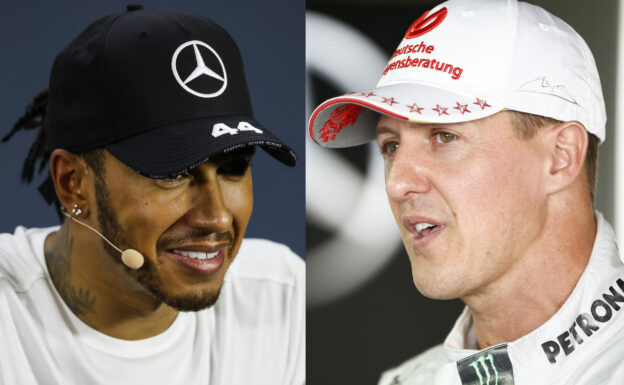Formula 1 Greatest Drivers Statistically

Analysing Formula 1’s greatest drivers will always be a harsh task and one which normally includes a high level of subjectivity. What in the world can we find in order to have an unbiased ranking in terms of the greatest drivers ever? Naturally, the numbers. Every Formula 1 fan, be it a casual viewer or a long-time follower, knows how good is Lewis Hamilton, but do they know his stats and how they compare to other Formula 1 greats? We will show those numbers here.
Regarding World Drivers’ Championships, the top five is formed by Michael Schumacher (seven titles), Hamilton (six), Juan Manuel Fangio (five), Alain Prost and Sebastian Vettel (four titles each). Out of these five drivers, three enter other big rankings that only enhances their individual legacies. Schumacher, Hamilton and Fangio are also part of the top five drivers with the highest percentage of race victories, which is a big number.
Fangio leads that table having won 46.15% of the races he entered (24 wins in 52 entries), while Hamilton sits fourth with 33.60% (84 wins in 250 entries) and Schumacher is fifth with 91 wins in 308 entries (29.55%). Second and third in the same ranking are Italian Alberto Ascari (39.39% in 33 starts) and the Great Jim Clark with 25 victories in 73 races (34.25%).
What is the main reason behind the inclusion of the list of the highest percentage of victories for this article? Probably, it is to stop the narrative that says that modern-era drivers have better numbers than those from other eras due to longer calendars. Fangio, Ascari, Clark, Hamilton and Schumacher all have similar winning rates and it only shows they were dominant in a determined period of time and their records are legit.
Other greats like Jackie Stewart, Ayrton Senna and Alain Prost also won more than 25% of the races they entered. Those numbers only show that much of the names we normally hear when debating the Formula 1 greatest drivers have earned the right to be included in many illustrious lists.
Of course, Formula 1 championships are what every driver aims for and to be among those who won many titles represents a huge matter. Schumacher and Hamilton, the two drivers with the most titles, will naturally be included in the debate of the Greatest of All Time.
Hamilton, on his side, has the chance to tie the German legend with seven titles before his career comes to an end. Having won five of the last six WDC and achieving 62 Grand Prix wins in that span, the Englishman is shooting to become the greatest statistical driver in the history of the pinnacle of motorsport.
He already leads the list of drivers with the most Pole Positions with the staggering number of 88, 20 more than his closest follower, Schumacher, and 31 more than the next active driver (Sebastian Vettel). Regarding the percentages of Poles, we will find similar names to those from the previous lists. Fangio leads the table again, with a whopping 55.7%, then Clark (45.21%), Ascari (42.42%), Senna (40.12%) and Hamilton (35.20%) come behind.
Schumacher does not make the top five on this list, but he is ranked eighth overall and fourth among drivers with at least 100 starts, which goes to show how dominant he was for an extended period of time.
The podium finishes, another big part of statistical analysis, have Schumacher as the outright leader with 155 podiums, Hamilton is following him closely and is expected to take the lead soon, as he has 151 podium finishes in 13 seasons, which gives him an average of 11.6 podiums per year.
Vettel with 120 podiums, Prost with 106 and Kimi Raikkonen with 103 round the top five. Fangio is the leader in terms of percentage of podium finishes among drivers with at least 30 starts, as he finished 35 of his 52 entries in the podium (67.31%). Hamilton (60.40%), Nino Farina (58.82%), Prost (52.48%) and Ascari (51.52%) are behind the Argentine Maestro.
Schumacher (50.32%) is sixth in the list of drivers with at least 30 entries and third between racers with 100 entries behind Hamilton and Prost.
As things stand, a top-five ranking of the greatest drivers statistically should be confirmed by Hamilton, Schumacher, Fangio, Clark and Ascari, who made the most out of his short F1 career before his untimely death in May of 1955.
Do you agree with this list of the greatest statistical drivers? What would Lewis Hamilton need to do to become the greatest driver of the sport? That, of course, if you think he is not already the best ever.
Comment and tell us your own top five with any criteria you would like.
✅ Check out more posts with related topics:













All I know is that all the hype about Max Verstappen is premature. Too many people are crowning him king long before he is even close to Lewis Hamilton. He needs to prove it on the track.
Finally someone who gets it. Max will not and will never win a championship
Thanx. I wondered why it took somebody this long to agree. Until Max puts up a few numbers, I see him acting like a baby. A little too smug for me. Lewis oozes class and caring..
It's between Jim Clark and Juan Fangio in my opinion as they were the most versatile and could drive anything, as well as having very impressive statistics. What one also needs to measure is the dominance of the cars they were driving vs the competition.
I never liked the idea of "The Best F1 Drivers", and even less the plain use of statistics to justify the results. Dick Crosbie mentions something really imoortant that normally is not even mentioned most of the time, the cars. But it is not just it, but teams, tires, everything made the difference in the history of F1. Now, it is only one supplier of tires. Before there were many. Some were better for qualifying, others for the race. Which motor was better, the Coventry-Climax FWMV V8, Matras, the Ferrari's V6, V8, the "Flat-12", the Fords-Corswort DFV and then DFWs later, V8s and/or V12s, Hondas, "flat, 45°, 90°, 120°...
✅ Checkout the latest 50 F1 Fans comments.